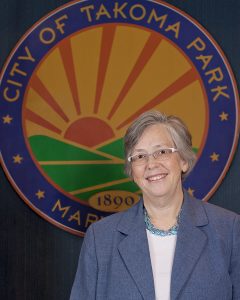Georgetown University Energy Prize brought together 50 communities that competed in a two-year competition to increase energy efficiency, reduce municipal and household energy budgets, and create replicable, nationwide models
Takoma Park, Maryland, (December 18, 2017) – The city of Takoma Park, Maryland, tied for third place in the final round of the Georgetown University Energy Prize (GUEP), a two-year, nationwide competition that brought together 50 communities in rethinking the way America’s small- to medium-sized towns, cities, and counties use energy.
In the final round, 10 top performing cities and counties were evaluated on their energy-saving approach, performance, and prospects for nationwide replicability and scalability.
The city of Fargo, North Dakota, took first place, while Fort Collins, Colorado, placed second and the city of Bellingham, Washington, tied for third with Takoma Park. The cities of Chula Vista, California, and Walla Walla, Washington, performed best overall in terms of the absolute reduction of energy use.
“Community-based initiatives are rising to the forefront of our national conversation about sustainability,” said Energy Prize executive director Uwe Brandes. “The communities that have participated in this competition have invented and implemented new approaches to reduce energy consumption and on that journey they have saved money and provided new leadership models for other communities to act.”
Over the last month a panel of judges representing academia and industry evaluated each community’s approach to innovative, replicable, and scalable energy efficiency programs. The 10 finalist communities were scored in weighted categories, including innovation; potential for replication; likely future performance; equitable access, community and stakeholder engagement; education; and overall quality and success. The winner was selected based on a combination of energy performance scores and the creation and advancement of new best practices over the course of the two-year energy-saving period.
“Takoma Park built a robust program with high levels of community engagement, including direct involvement of Mayor Stewart and city council members in The Neighborhood Energy Challenge,” said Brandes, who prior to joining Georgetown was Senior Vice President of the Urban Land Institute and is now faculty director of the master’s program in Urban and Regional Planning at Georgetown. “Gina Mathias, Sustainability Manager for City of Takoma Park, worked tirelessly to ensure city residents were engaged in rethinking the way they use energy.”
During the competition, Takoma Park saved almost 101 billion BTUs of energy, and reduced carbon emissions by 5,364 metric tons. Takoma Park achieved remarkably high levels of residential participation with its “The Neighborhood Energy Challenge.” This competition within the competition engaged all 18 of Takoma Park’s neighborhoods, and 22% of all housing units (single and multi-family) completed, at minimum, an entry level energy assessment with installs including CFLs, LEDs, faucet aerators, shower heads, pipe insulation, and smart power strips. Their fun and quirky marketing campaigns, featuring viral videos, festivals, and “tiny home” workshops, led to effective and educational outreach strategies that made them a leader in community engagement.
The Energy Prize released the complete set of data and calculations which document the overall energy reduction achieved by each of the cities that completed the competition. This comprehensive data is available on its website www.guep.org. Leading up to the final stage of the competition, communities were ranked by overall energy score, which quantified each community’s energy-saving performance during the 2015 and 2016 competition years. The score measured the percentage by which a community reduced energy against its 2013 and 2014 use. The overall energy score comprised 10 percent of the final qualitative evaluation. The 10 finalist communities ranked by overall energy score follow:
1. Chula Vista, California (-9.5450) 2. Walla Walla, Washington (-9.1141) 3. Takoma Park, Maryland (-7.8790) 4. Fargo, North Dakota (-6.8472) 5. Fort Collins, Colorado (-6.0757) | 6. Berkeley, California (-4.7207) 7. Oberlin, Ohio (-4.5536) 8. Bellingham, Washington (-4.4243) 9. Montpelier, Vermont (-4.2793) 10. Bellevue, Washington (-4.2333) |
Since 2014, 50 cities and counties across the U.S. have worked to reduce their energy consumption through engagement in the competition. At the end of 2016, these communities had collectively saved 11.5 trillion BTUs of energy, reducing their carbon emissions by an estimated 2.76 million metric tons—the equivalent of taking one car off the road for every 30 minutes of the competition—and saving nearly $100 million from municipal and household energy budgets.
“The evaluation panel was thoroughly impressed with the deeply thoughtful and creative approach so many communities took throughout the competition,” said Brandes. “Each realized substantial savings and brought greater attention to this important issue, proving that small- and medium-sized communities across the United States are in the position to design and promote innovative strategies and further national and international conversations about energy use.”
“Their ingenuity and effective performance show us what is possible and will serve as valuable models for other communities seeking to innovate their practices. They have a lot of lessons to teach us all,” said Brandes.
About Georgetown University Energy Prize
The Georgetown University Energy Prize aimed to rethink America’s energy use by harnessing the ingenuity and community spirit of towns and cities all across America. From 2013 – 2017, the Prize has challenged small- to medium-sized towns, cities, and counties to rethink their energy use, and implement creative strategies to increase efficiency. Throughout the competition, local governments, residents, utilities, and other community leaders worked together to demonstrate success in sustainably reducing energy consumption. For more information, visit www.guep.org.

